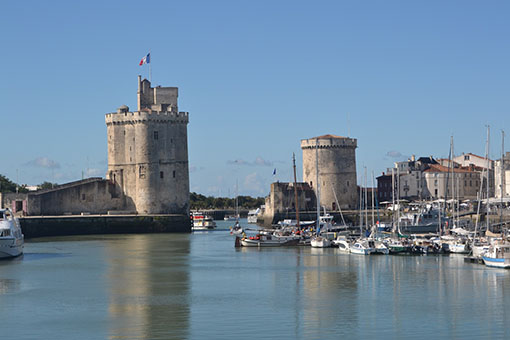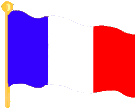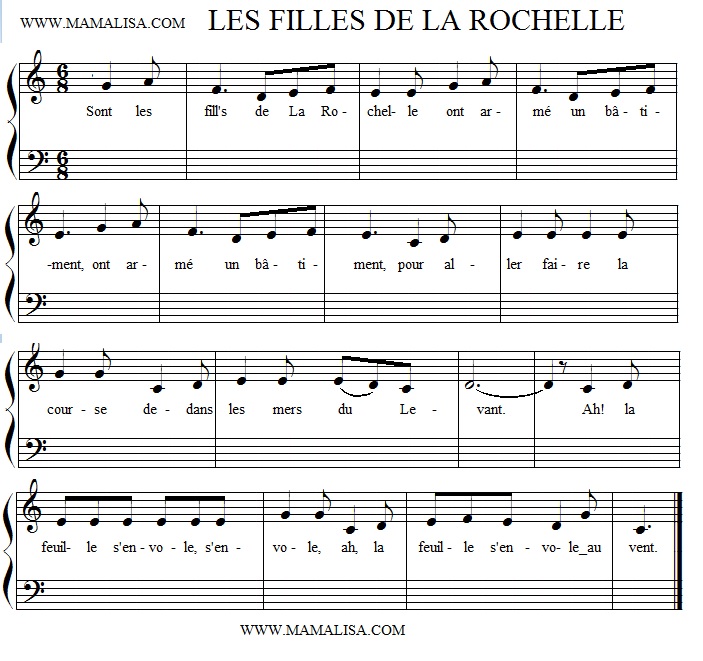Les filles de La Rochelle
"This is the version I learned in 4th or 5th grade." -Monique
There are a few versions of this song, some with final verses that have a double-entendre (some not appropriate for children).

Les filles de La Rochelle
The Girls from La Rochelle
Chanson de marins
Sea Shanty
(French)
(English)
1. Sont les filles de La Rochelle,
Ont armé un bâtiment,
Ont armé un bâtiment,
Pour aller faire la course
Dedans les mers du Levant.
(Refrain)
Ah ! La feuille s'envole, s'envole,
Ah ! La feuille s'envole au vent.
2. La grand-vergue est en ivoire,
Les poulies en diamant,
Les poulies en diamant,
La grand-voile est en dentelle,
La misaine en satin blanc.
3. Les cordages du navire
Sont de fils d'or et d'argent,
Sont de fils d'or et d'argent,
Et la coque est en bois rouge
Travaillé fort proprement.
4. L'équipage du navire*,
C'est tout filles de quinze ans,
C'est tout filles de quinze ans,
Le capitaine qui les commande
Est le roi des bons enfants.
1. The Girls from La Rochelle
Have fit out a ship,
Have fit out a ship
To go privateering
In the Eastern seas.
(Chorus)
Ah! The leaf is flying away, flying away
Ah! The leaf is flying away in the wind.
2. The main yard is made of ivory,
The pulleys, of diamond,
The pulleys, of diamond,
The mainsail is made of lace,
The foresail, of white satin.
3. The vessel's ropes
Are gold and silver strings,
Are gold and silver strings,
And the hull is red wood
Very neatly wrought.
4. The ship's crew
Is all fifteen year old girls,
Is all fifteen year old girls,
The captain who commands them
Is the king of the good-natured.
Notes
*Alternate version of the 4th verse:
L'équipage du navire,
C'est tout filles de quinze ans,
C'est tout filles de quinze ans,
Les gabiers de la grande hune
N'ont pas plus de dix-huit ans.
English Translation
The ship's crew
Is all fifteen year old girls,
Is all fifteen year old girls,
The maintop boatswains
Aren't older than eighteen.
Additional verses sung in the first YouTube video:
5. Hier, faisant sa promenade
Dessus le gaillard d'avant,
Aperçut une brunette
Qui pleurait dans les haubans.
6. Qu'avez-vous, gentille brunette,
Qu'avez-vous à pleurer tant ?
Av' vous perdu père et mère
Ou quelqu'un de vos parents ?
7. J'ai cueilli la rose blanche,
Qui s'en fut la voile au vent,
Elle est partie vent arrière,
Reviendra-z-en louvoyant.
English Translation
5. Yesterday during his walk
On the forecastle
On the forecastle
He saw a brunette
Who was weeping in the shrouds [part of the rigging].
6. What's wrong, nice brunette,
Why do you cry so much?
Why do you cry so much?
Did you lose father and mother
Or someone in your family?
7. I picked the white rose
That sailed away in the wind,
That sailed away in the wind,
It went away downwind,
It'll come back in a roundabout route.
Alternate ending:
7. Je ne pleure ni mon père (I'm not crying over my father)
Ni ma mère ni mes parents, (Or over my mother or my relatives)
Ni ma mère ni mes parents, ( Or over my mother or my relatives)
J'ai perdu mon avantage (I lost my advantage)
Qui s'en fut la voile au vent. (It went with the sail in the wind.)
8. Il est parti vent arrière (It went on a tailwind)
Il reviendra vent devant (It'll come back on a headwind)
Il reviendra vent devant (It'll come back on a headwind)
Il reviendra mouiller l'ancre (It'll come back to cast anchor)
Dans la rade des bons enfants. (In the harbor of the good-natured)
Comments
This forecastle shanty goes back to early 1700's. A similar description of a ship can be found in a 15th century songbook, here are the lyrics starting from line 12 with the original spelling but it has a different tune:
"Veez cy mes amours venir,
En ung beau basteau sur Seine
Qui est couvert de sappin
Les cordons en sont de saye,
La voille en est de satin;
Le grant mast en est d'iviere,
L'estournay en est d'or fin;
Les mariniers qui le meynent
Ne sont pas de ce pais
L'ung est filz du roy de France,
Il porte la fleur de lis;
L'aultre est filz….
Cestuy la est mon amy."
English Translation
See my beloved come
In a beautiful ship on the river Seine,
It's covered in fir wood,
The ropes are silk,
The sail is satin,
The main-mast is ivory,
The tiller is fine gold;
The sailors who sail it
Are not from this country,
One is the son of the King of France,
He wears the fleur-de-lis,
The other one is a son [?]
That one is my beloved.


Thanks!
Thanks!
Thanks and Acknowledgements
Translated by Monique Palomares with Lisa Yannucci.


























